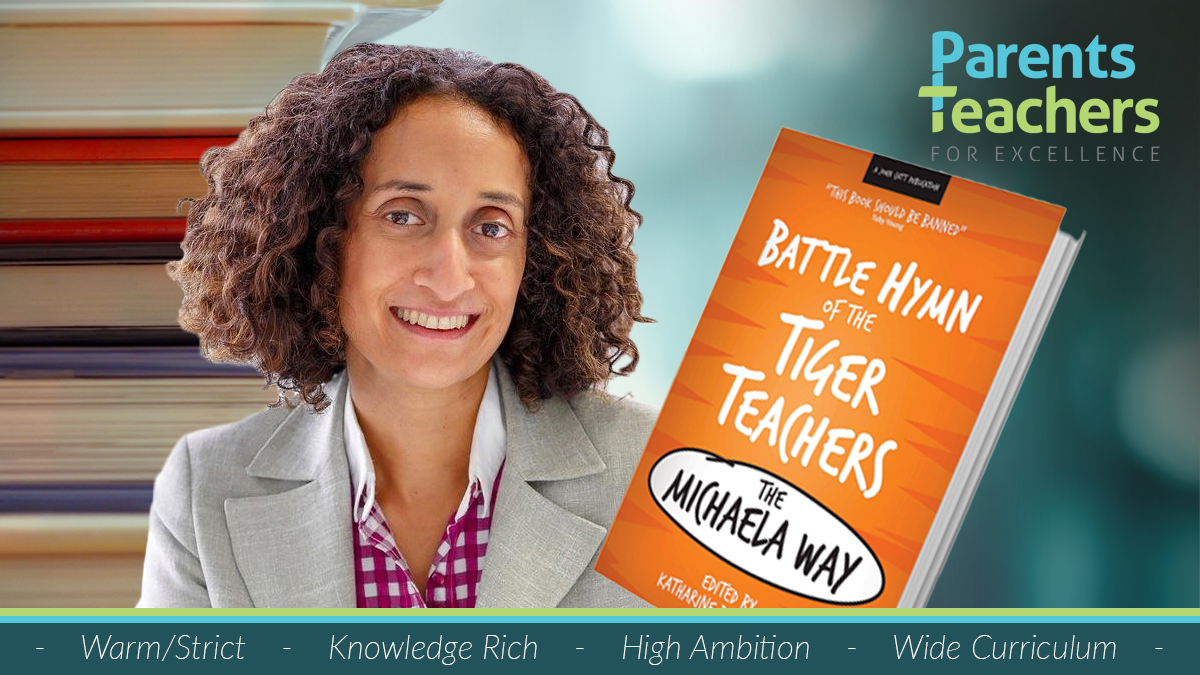The PTE Newsletter – Tuesday 11 May
In normal times it would have been SATs week in primary schools and secondary pupils would have been about to start GCSE and A-level exams. However, it was not to be, and one wonders what things will be like this time next year?
Book review – “Battle Hymn Of The Tiger Teachers”
Right from the beginning, so much about Michaela Community School (MCS) and its founder Katharine Birbalsingh has been marked as “controversial”.
Most of the time the description has been unfair and unnecessary – there is little at MCS that isn’t done by lots of other schools around the country, yet those places don’t attract the same kind of criticism.
That said, in the early days MCS did deliberately court attention, particularly in the bold and unapologetic way that it promoted its underlying philosophy and approaches. Through tweeting and blogging its teachers gained a reputation as an assertive, thought-provoking bunch. They definitely helped to turn the dial on a range of practices in schools, and their first book – “Battle Hymn of the Tiger Teachers – The Michaela Way”– played a big part in this when it came out in late 2016.
The school was in only its third year of operation, and for an institution yet to face an Ofsted inspection or set of exam results bold claims were made throughout the book – from the introduction by Katharine Birbalsingh (“Free at last”) onwards. READ MORE HERE.
Support for primary curriculum development
We wanted to flag up a couple of really useful training sessions that are happening in the next week or so. If you’re working on a primary curriculum, they could be of interest.
Run by the Primary Knowledge Curriculum team, the first session is this week and called “Closing the Gap”. It looks at how schools can can support their most disadvantaged and vulnerable pupils, as well as pupils with SEND, to achieve high expectations through an ambitious and well-sequenced curriculum. Details are HERE.
And next week they are running another session, “Our curriculum journey”, where they will share the journey they have been on over the past eight years, developing and embedding the Primary Knowledge Curriculum in their Trust’s primaries. Details for this are HERE.
Latest news & views
The Prime Minister announced yesterday that secondary school pupils will no longer have to wear masks in classrooms or communal areas. The Department for Education said “the latest data shows infection rates continuing to decrease”and not having to wear masks would “improve interaction between teachers and students”.
However, the rule that staff and other adults should wear face coverings in situations where social distancing is not possible, including corridors and communal areas, will remain in place.
Another change kicking in next Monday is that restrictions on overnight school trips are being relaxed. This means that residentials will be able to take place once more. Outdoor ed centres, coach companies, and sick bag manufacturers will be amongst those rejoicing at this step towards normality.
The workload created to generate teacher-assessed grades (TAGs) for GCSEs and A-levels continues to create news. The Guardian had an article on Sundaywith testimonies from staff, and it makes for a striking read. In the TES, Adam Riches asks “Why can’t Ofqual tell us the plan for GCSEs in 2022?”, pointing out that the lives of teachers and pupils would be made a lot easier if clarity regarding 2022 qualifications was given sooner rather than later.
With ironic timing, given the TAG situation, the DfE and Ofsted have issued a number of pledges as part of an “Education Staff Wellbeing Charter”. There are 12 commitments, including that Ofsted will review the impact its inspection framework has on staff wellbeing, and the government has promised not to publish guidance outside of working hours as part of a new charter unveiled today.
As part of the Charter, schools are invited to make 11 pledges. These include extra support for staff whose role involves a “significant emotional component”and “driving down unnecessary workload”. The charter is voluntary and becomes available this autumn for those wanting to sign up.
Elsewhere, artists and musicians accused the government of neglecting the country’s “cultural national health” by proposing a 50% funding cut to arts subjects at universities, potentially from this autumn. A consultation by the Office for Students (OfS) and the education secretary, Gavin Williamson, suggested halving the amount spent on “high cost” higher education arts subjects in England – which it said were not “strategic priorities”. It will be interesting to see the outcome of the consultation – and what the final decision taken is.
And Oxford University’s drive for greater diversity amongst its undergraduate population seems to be paying off. Among other changes, it has almost doubled the proportion of students from disadvantaged backgrounds starting their studies, with the proportion of new students from socio-economically disadvantaged areas rising from 8.2% to 15.9% over the last five years.
Finally, a couple of opinion pieces to finish off today’s roundup.
Jonny Kay makes the case for space in the schools curriculum being found to teach children how to spot “fake news”. He asks “if a central tenet of education is to prepare young people and students for the challenges that life will throw at them, are we doing enough to help them deal with the issue of fake news (an issue which presents a daily challenge)?”
In Schools Week there is an excellent piece by Headteacher Caroline Barlow, responding to comments by Baroness Berridge about the “moral purpose” of some Headteachers. Caroline argues that the academies minister is right to say collaboration between schools is a matter of morality but that she’s looking for it in the wrong place. It’s well worth a read.
Have a great day!
